GCSE OPTIONS 2023-24
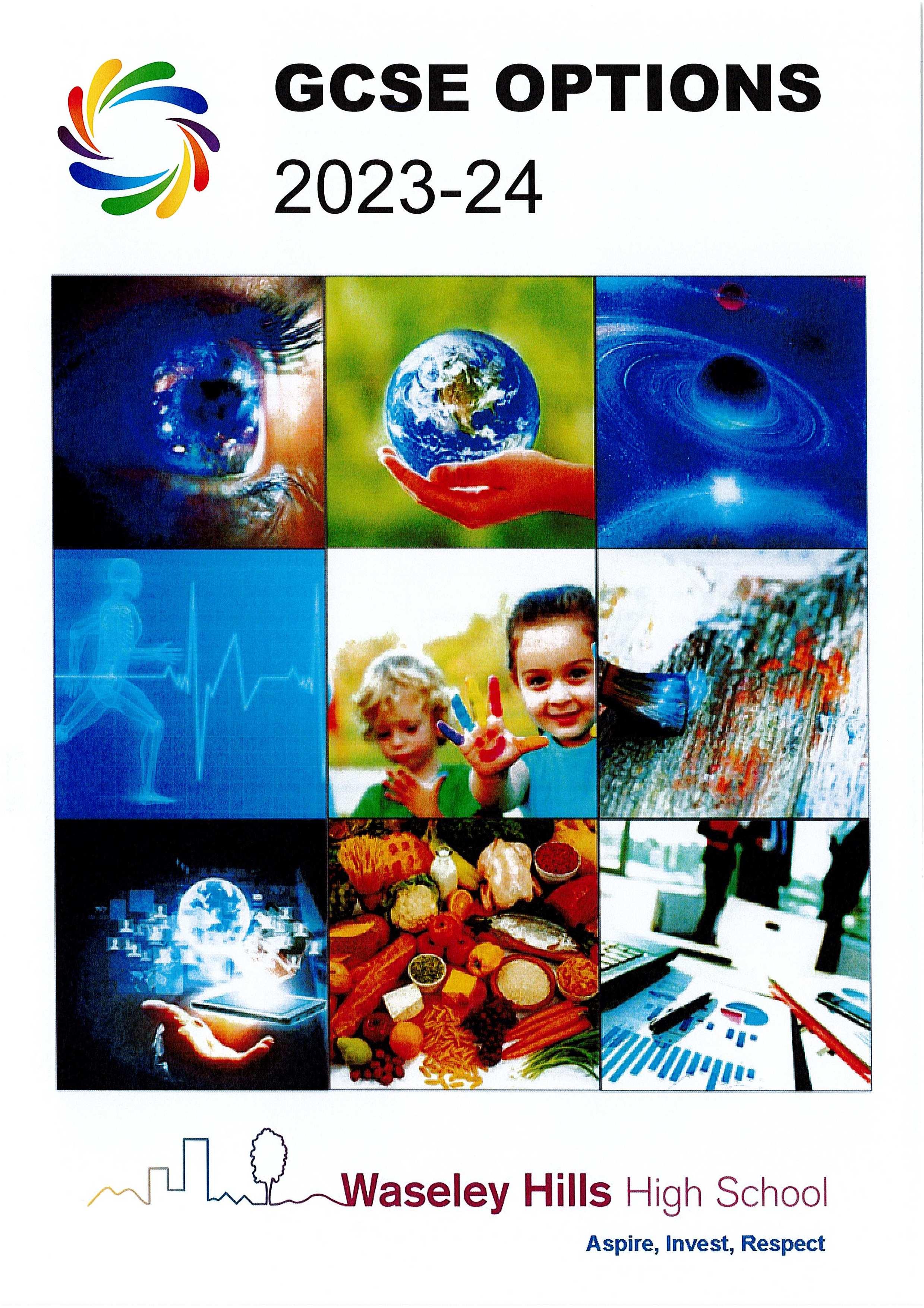
pis aseley Hills High School Aspire, Invest, Respect
aseley Hills High School
Aspire, Invest, Respect
GCSE Option
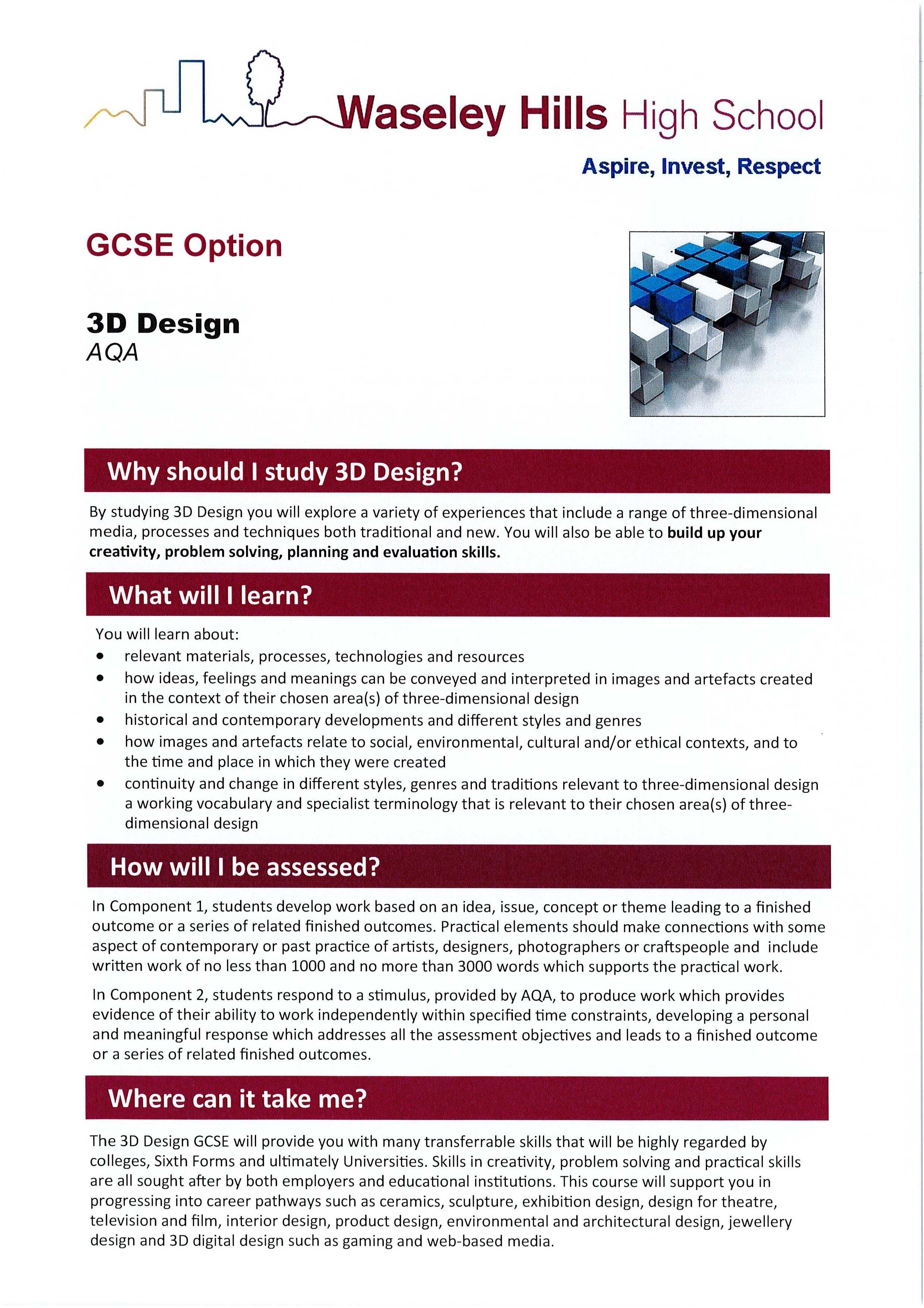
3D Design AQA
Why should | study 3D Design?
By studying 3D Design you will explore a variety of experiences that include a range of three-dimensional media, processes and techniques both traditional and new. You will also be able to build up your creativity, problem solving, planning and evaluation skills.
VdateLan LLM (tel aate
You will learn about: e relevant materials, processes, technologies and resources e how ideas, feelings and meanings can be conveyed and interpreted in images and artefacts created in the context of their chosen area(s) of three-dimensional design historical and contemporary developments and different styles and genres how images and artefacts relate to social, environmental, cultural and/or ethical contexts, and to the time and place in which they were created e@ continuity and change in different styles, genres and traditions relevant to three-dimensional design a working vocabulary and specialist terminology that is relevant to their chosen area(s) of threedimensional design How will | be assessed?
In Component 1, students develop work based on an idea, issue, concept or theme leading to a finished outcome or a series of related finished outcomes. Practical elements should make connections with some aspect of contemporary or past practice of artists, designers, photographers or craftspeople and include written work of no less than 1000 and no more than 3000 words which supports the practical work. In Component 2, students respond to a stimulus, provided by AQA, to produce work which provides evidence of their ability to work independently within specified time constraints, developing a personal and meaningful response which addresses all the assessment objectives and leads to a finished outcome or a series of related finished outcomes.
Where can it take me?
The 3D Design GCSE will provide you with many transferrable skills that will be highly regarded by colleges, Sixth Forms and ultimately Universities. Skills in creativity, problem solving and practical skills are all sought after by both employers and educational institutions. This course will support you in progressing into career pathways such as ceramics, sculpture, exhibition design, design for theatre, television and film, interior design, product design, environmental and architectural design, jewellery design and 3D digital design such as gaming and web-based media.
aseley Hills High Schoo!
Aspire, Invest, Respect
GCSE Option
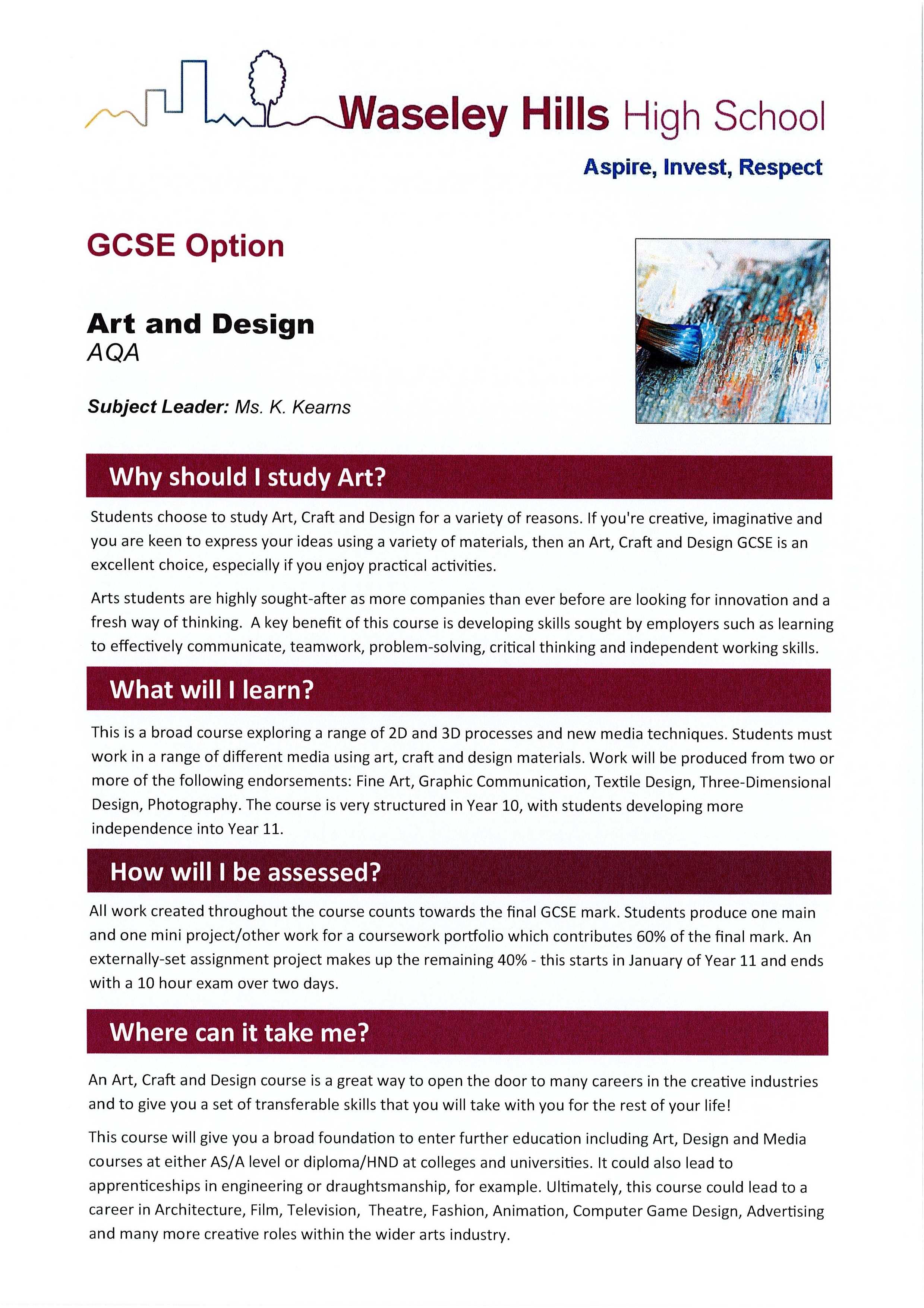
Art and Design AQA
Subject Leader: Ms. K. Kearns
Why should | study Art?
Students choose to study Art, Craft and Design for a variety of reasons. If you're creative, imaginative and you are keen to express your ideas using a variety of materials, then an Art, Craft and Design GCSE is an excellent choice, especially if you enjoy practical activities. Arts students are highly sought-after as more companies than ever before are looking for innovation and a fresh way of thinking. A key benefit of this course is developing skills sought by employers such as learning to effectively communicate, teamwork, problem-solving, critical thinking and independent working skills.
What will | learn?
This is a broad course exploring a range of 2D and 3D processes and new media techniques. Students must work in a range of different media using art, craft and design materials. Work will be produced from two or more of the following endorsements: Fine Art, Graphic Communication, Textile Design, Three-Dimensional
Design, Photography. The course is very structured in Year 10, with students developing more independence into Year 11.
How will | be assessed?
All work created throughout the course counts towards the final GCSE mark. Students produce one main and one mini project/other work for a coursework portfolio which contributes 60% of the final mark. An externally-set assignment project makes up the remaining 40% - this starts in January of Year 11 and ends with a 10 hour exam over two days.
Where can it take me?
An Art, Craft and Design course is a great way to open the door to many careers in the creative industries and to give you a set of transferable skills that you will take with you for the rest of your life!
This course will give you a broad foundation to enter further education including Art, Design and Media courses at either
AS/A level or diploma/HND at colleges and universities. It could also lead to apprenticeships in engineering or draughtsmanship, for example. Ultimately, this course could lead to a career in Architecture, Film, Television, Theatre, Fashion, Animation, Computer Game Design, Advertising and many more creative roles within the wider arts industry.
aseley Hills High School
Aspire, Invest, Respect
“BTEC Option
BTEC in Tech Award
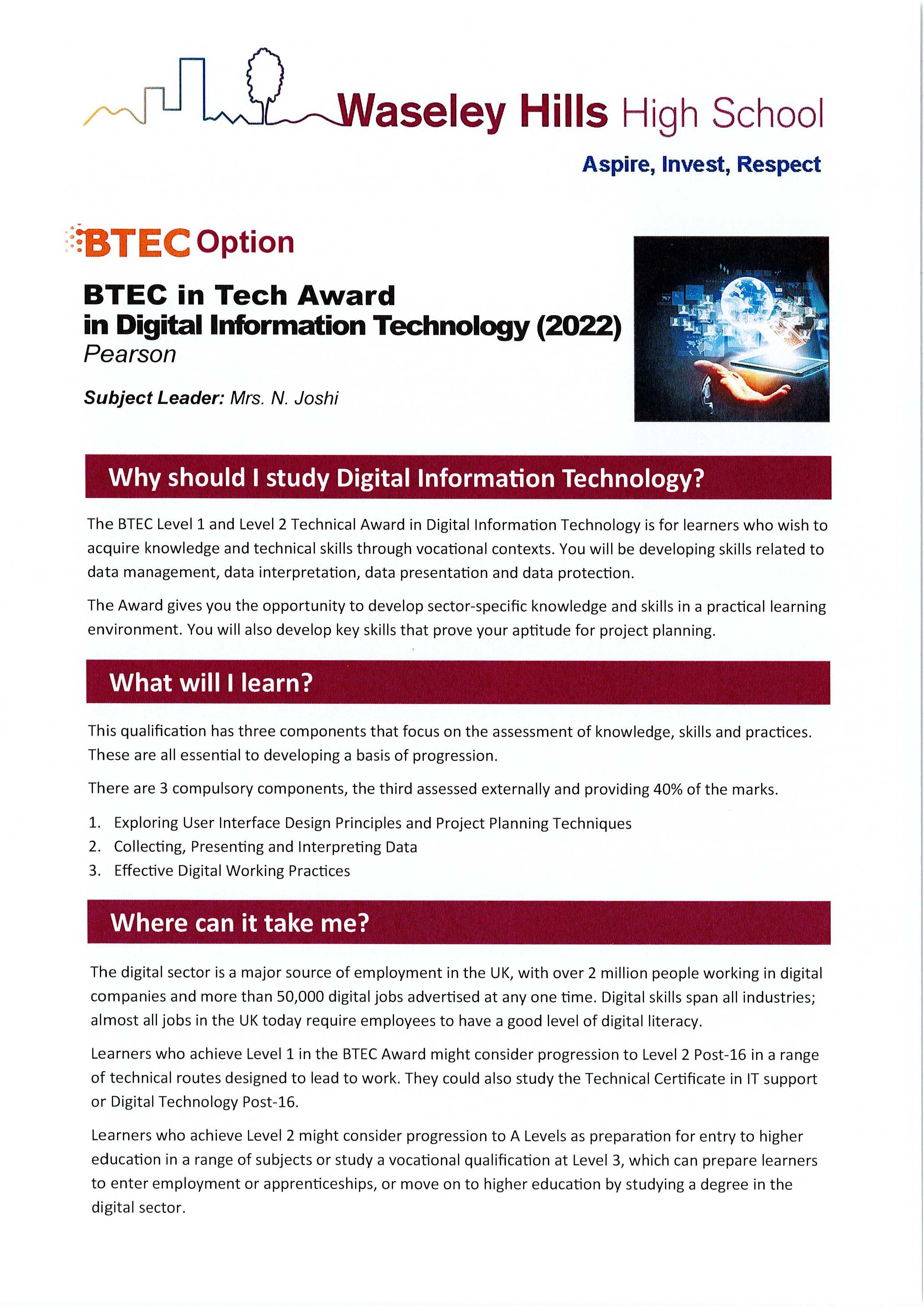
in Digital Information Technology
Pearson
Subject Leader: Mrs. N. Joshi
(2022)
Why should | study Digital Information Technology?
The BTEC Level 1 and Level 2 Technical Award in Digital Information Technology is for learners who wish to acquire knowledge and technical skills through vocational contexts. You will be developing skills related to data management, data interpretation, data presentation and data protection. The Award gives you the opportunity to develop sector-specific knowledge and skills in a practical learning environment. You will also develop key skills that prove your aptitude for project planning.
What will | learn?
This qualification has three components that focus on the assessment of knowledge, skills and practices.
These are all essential to developing a basis of progression.
There are 3 compulsory components, the third assessed externally and providing 40% of the marks.
1. Exploring User Interface Design Principles and Project Planning Techniques
2. Collecting, Presenting and Interpreting Data
3. Effective Digital Working Practices
Where can it take me?
The digital sector is a major source of employment in the UK, with over 2 million people working in digital companies and more than 50,000 digital jobs advertised at any one time. Digital skills span all industries; almost all jobs in the UK today require employees to have a good level of digital literacy.
Learners who achieve Level 1 in the BTEC Award might consider progression to Level 2 Post-16 in a range of technical routes designed to lead to work. They could also study the Technical Certificate in IT support or Digital Technology Post-16.
Learners who achieve Level 2 might consider progression to A Levels as preparation for entry to higher education in a range of subjects or study a vocational qualification at Level 3, which can prepare learners to enter employment or apprenticeships, or move on to higher education by studying a degree in the digital sector.
aseley Hills High Schoo!
Aspire, Invest, Respect
GCSE Option Business Studies
Eduqas
Subject Leader: Mrs. E. Sellers
Why should | study Business Studies?
Every organisation of every size has to consider costs and revenues, customers and competitors. Charities, hospitals, schools and large global brands such as Starbucks, Coca Cola, Nike and Apple all employ people with business skills, experience and qualifications. Business Studies provides an universal skill set that can be used wherever you are in the world and whatever organisation you may work for.
The course will focus on developing clear and well justified recommendations using current and modern contexts from the world you live in and will be employed in. You will identify and understand the factors that businesses consider every day in every decision they make.
What will | learn?
You will learn about how the world of business works and its relevance to almost every aspect of modern society. Amongst other topics, you will learn about business ownership, finance, marketing and economics and discover some of the methods and techniques used to analyse an organisation’s performance.
How will | be assessed?
Assessment is 100% exam-based. There are 2 papers, the first exploring the theory covered in lessons and how it can be applied in different business contexts. The second paper will assess students’ ability to understand data and how a business uses this information in effective decision-making.
Where can it take me?
A GCSE in Business Studies can lead to a range of exciting opportunities to study business-related subjects at a higher level. Business can be the gateway into a number of great career choices: as well as being a relevant and interesting subject in its own right, it is a useful supplement subject alongside almost any degree course at university. Some common courses to combine with Business are Law, Accounting, Economics, Journalism, English, ICT and Engineering.
We live in a global world and technology has enabled even the smallest business to access international markets. Business Studies is a universal subject. There are few, if any, careers for which an understanding of business would not be of benefit. Business Studies can also be key to attaining highly paid and challenging roles in all levels of management in all industries.
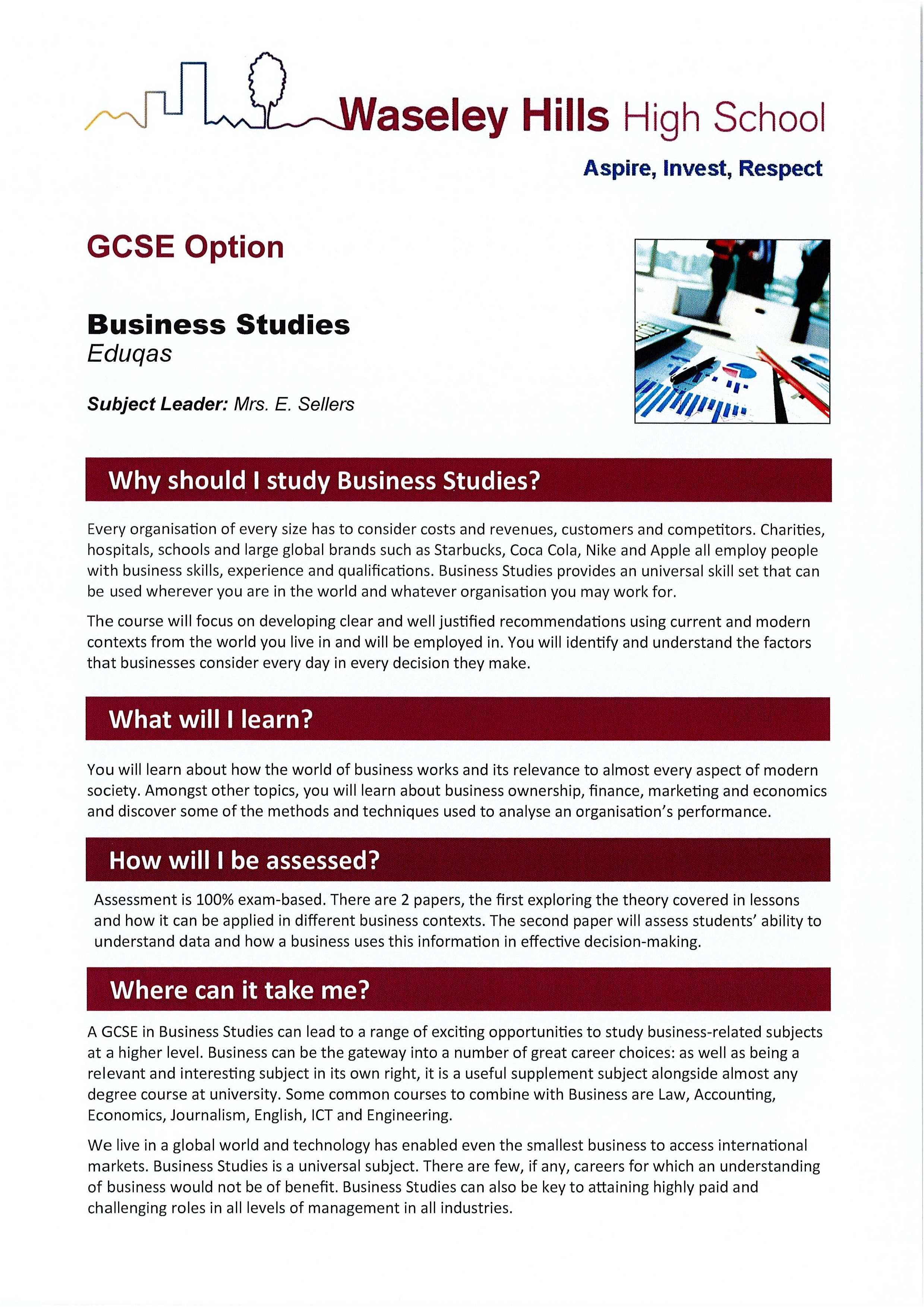
aseley Hills High School
Aspire, Invest, Respect
G
CSE Option
Children’s Learning and Development
OCR
Subject Leader: Mrs. J. Williams
Why should | study Children’s Learning and Development?
Our new Level 1/2 Cambridge National Certificate in Children’s Learning and Development (course code
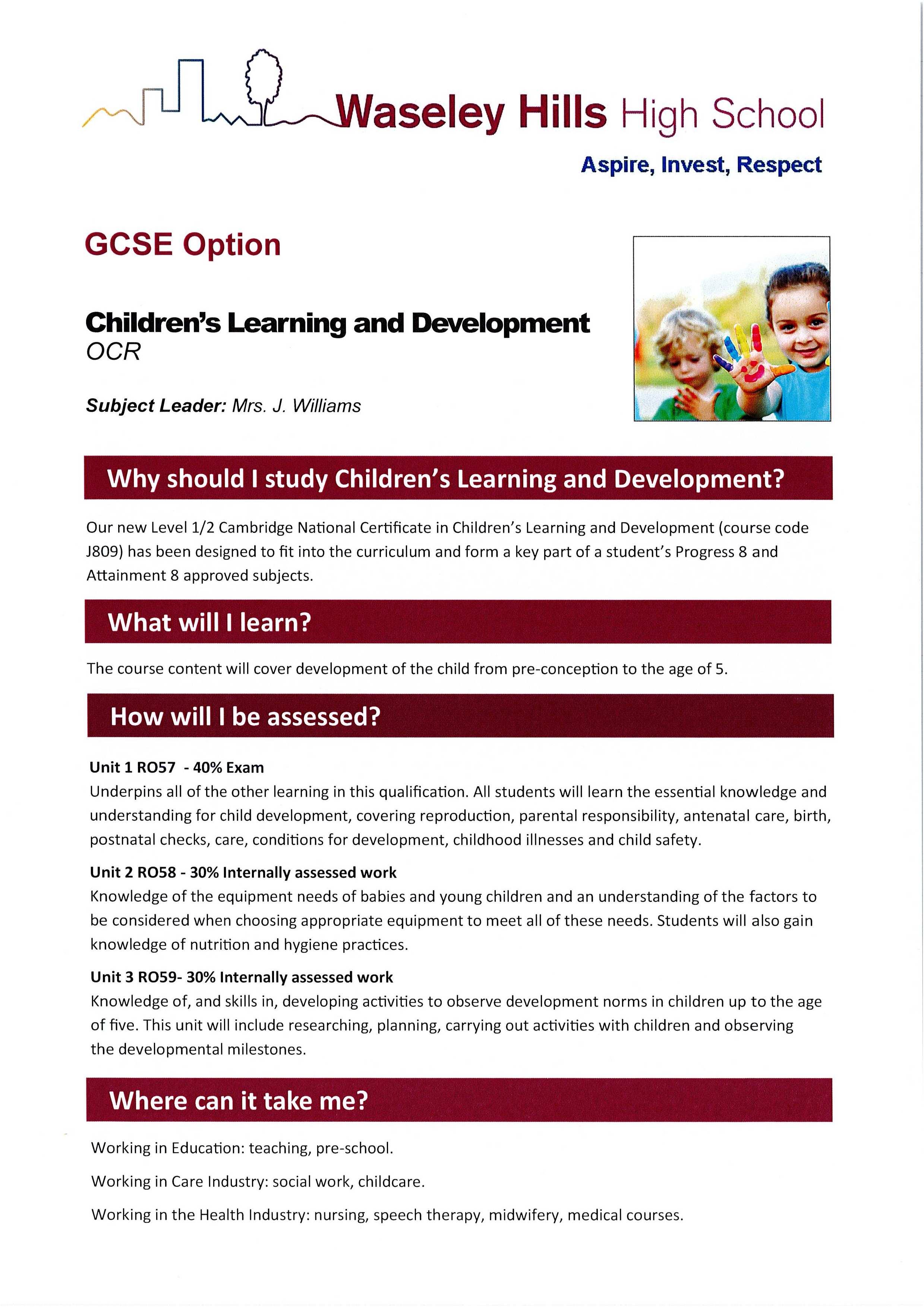
J809) has been designed to fit into the curriculum and form a key part of a student’s Progress 8 and
Attainment 8 approved subjects.
VV areLe IM mete) aake
The course content will cover development of the child from pre-conception to the age of 5.
How will | be assessed?
Unit 1 ROS57 - 40% Exam
Underpins all of the other learning in this qualification. All students will learn the essential knowledge and understanding for child development, covering reproduction, parental responsibility, antenatal care, birth, postnatal checks, care, conditions for development, childhood illnesses and child safety.
Unit 2 RO58 - 30% Internally assessed work
Knowledge of the equipment needs of babies and young children and an understanding of the factors to be considered when choosing appropriate equipment to meet all of these needs. Students will also gain knowledge of nutrition and hygiene practices.
Unit 3 RO59- 30% Internally assessed work
Knowledge of, and skills in, developing activities to observe development norms in children up to the age of five. This unit will include researching, planning, carrying out activities with children and observing the developmental milestones.
Where can it take me?
Working in Education: teaching, pre-school.
Working in Care Industry: social work, childcare.
Working in the Health Industry: nursing, speech therapy, midwifery, medical courses.
le w
asetey Hills High School
Aspire, Invest, Respect
GCSE Option
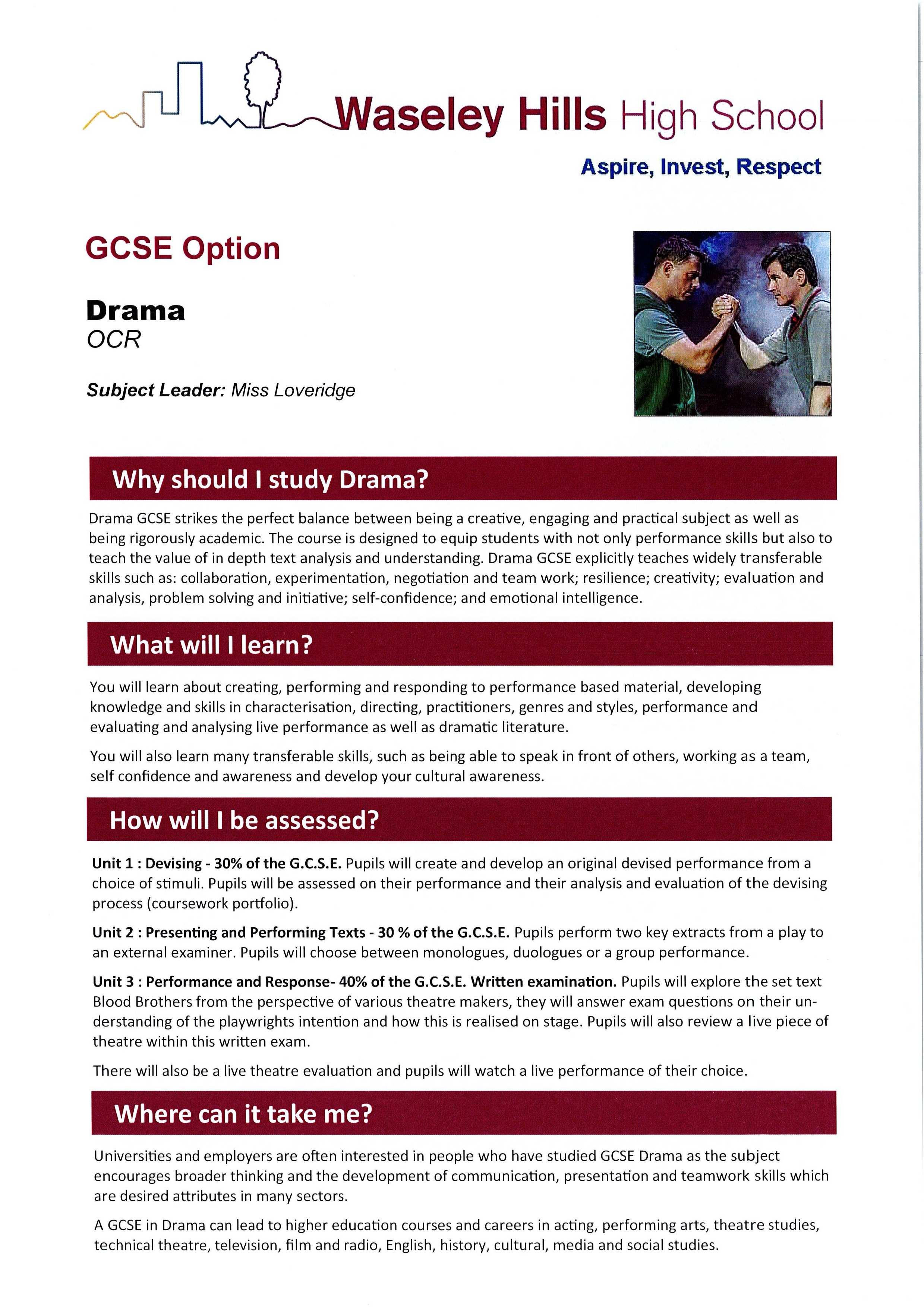
Drama
OCR
Subject Leader: Miss Loveridge Why should | study Drama?
Drama GCSE strikes the perfect balance between being a creative, engaging and practical subject as well as being rigorously academic. The course is designed to equip students with not only performance skills but also to teach the value of in depth text analysis and understanding. Drama GCSE explicitly teaches widely transferable skills such as: collaboration, experimentation, negotiation and team work; resilience; creativity; evaluation and analysis, problem solving and initiative; self-confidence; and emotional intelligence.
What will | learn?
You will learn about creating, performing and responding to performance based material, developing knowledge and skills in characterisation, directing, practitioners, genres and styles, performance and evaluating and analysing live performance as well as dramatic literature.
You will also learn many transferable skills, such as being able to speak in front of others, working as a team, self confidence and awareness and develop your cultural awareness.
How will | be assessed?
Unit 1 Devising - 30% of the G.C.S.E. Pupils will create and develop an original devised performance from a choice of stimuli. Pupils will be assessed on their performance and their analysis and evaluation of the devising process (coursework portfolio).
Unit 2 Presenting and Performing Texts - 30 % of the G.C.S.E. Pupils perform two key extracts from a play to an external examiner. Pupils will choose between monologues, duologues or a group performance.
Unit 3 Performance and Response- 40% of the G.C.S.E. Written examination. Pupils will explore the set text Blood Brothers from the perspective of various theatre makers, they will answer exam questions on their understanding of the playwrights intention and how this is realised on stage. Pupils will also review a live piece of theatre within this written exam.
There will also be a live theatre evaluation and pupils will watch a live performance of their choice.
Where can it take me?
Universities and employers are often interested in people who have studied
GCSE Drama as the subject encourages broader thinking and the development of communication, presentation and teamwork skills which are desired attributes in many sectors.
A GCSE in Drama can lead to higher education courses and careers in acting, performing arts, theatre studies, technical theatre, television, film and radio, English, history, cultural, media and social studies.
Ue waseley Hills High Schoo!
Aspire, Invest, Respect
GCSE Option
Food Preparation and Nutrition
AQA
Subject Leader: Mrs J Williams
Why should | study Food Preparation and Nutrition?

A GCSE in Food Preparation and Nutrition is an exciting and creative course which focuses on practical cooking skills to ensure students develop a thorough understanding of nutrition, food provenance and the working characteristics of food materials.
At its heart, this qualification focuses on nurturing students’ practical skills to give them a strong understanding of nutrition and current food-related issues.
Vi ateh eM tl ans
1. Food Safety
2. Nutritional Value of Foods.
3. Food Choice
4. Food Science
5. Food Provenance
Some Food and Nutrition lessons are double lessons in order to complete a range of practical skills.
How will | be assessed?
50% Exam and 50% Non-exam assessment (15% for Food Investigation and 35% for Food Preparation
Assessment)
Where can it take me?
Working in the Food Industry: recipe development, analysis and testing.
Working in the Health industry: dietician, nutritionist.
Working in the Hospitality and Catering industry: event planning, chef, food outlets.
Food and Nutrition links well with Business Studies, Sciences and Physical Education.
NO Waseley Hills High School
Aspire, Invest, Respect
GCSE Option
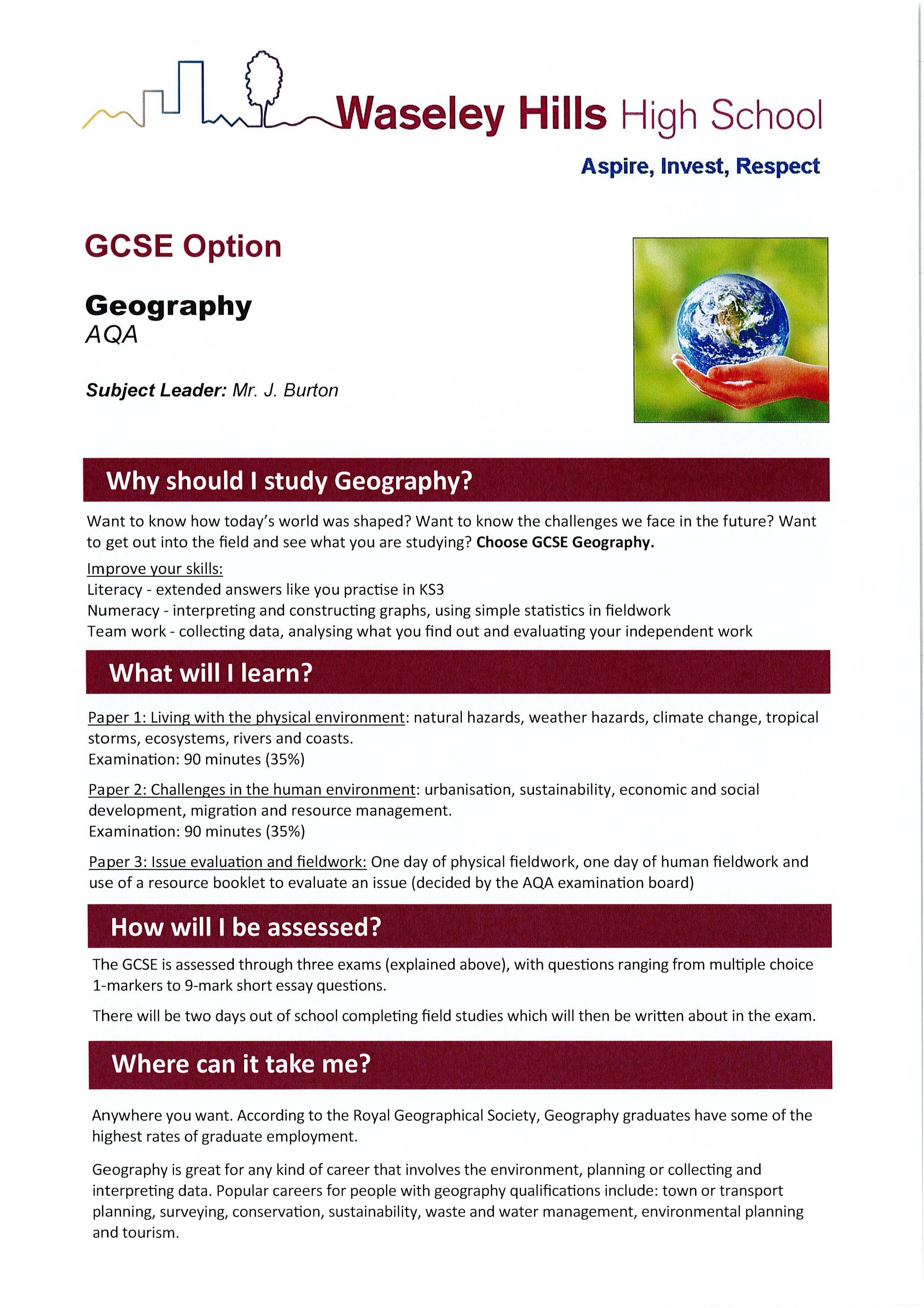
Geography
AQA
Subject Leader: Mr. J. Burton
Why should | study Geography?
Want to know how today’s world was shaped? Want to know the challenges we face in the future? Want
to get out into the field and see what you are studying? Choose GCSE Geography.
Improve your skills:
Literacy - extended answers like you practise in KS3
Numeracy - interpreting and constructing graphs, using simple statistics in fieldwork
Team work - collecting data, analysing what you find out and evaluating your independent work
What will | learn?
Paper 1: Living with the physical environment: natural hazards, weather hazards, climate change, tropical
storms, ecosystems, rivers and coasts.
Examination: 90 minutes (35%)
Paper 2: Challenges in the human environment: urbanisation, sustainability, economic and social
development, migration and resource management.
Examination: 90 minutes (35%)
Paper 3: Issue evaluation and fieldwork: One day of physical fieldwork, one day of human fieldwork and use of a resource booklet to evaluate an issue (decided by the AQA examination board)
How will | be assessed?
The GCSE is assessed through three exams (explained above), with questions ranging from multiple choice
1-markers to 9-mark short essay questions.
There will be two days out of school completing field studies which will then be written about in the exam.
Where can it take me?
Anywhere you want. According to the Royal Geographical Society, Geography graduates have some of the
highest rates of graduate employment.
Geography is great for any kind of career that involves the environment, planning or collecting and interpreting data. Popular careers for people with geography qualifications include: town or transport
planning, surveying, conservation, sustainability, waste and water management, environmental planning and tourism.
UY Waseley Hills High School
Aspire, Invest, Respect
GCSE Option History AQA

Subject Leader: Mrs. S. Dumycz
Why should | study History?
History is one of the most valued subjects at GCSE as it opens the doors to many pathways for the future.
If you’ve ever asked the question, “Why?”, then History will provide many of the answers as to why our world operates the way it does - Brexit, Donald Trump, North Korea, immigration, pandemics and many more.
At GCSE you will learn how to analyse speeches and paintings and how to construct a forceful and balanced argument.
re will | learn?
From gangsters to Galen; Vesalius to the Vietnam War; Hippocrates to Hooverville's — there’s a bit of everything in GCSE History. We follow the AQA specification with four units of study and two examinations at the end of Year 11.
Paper 1 is on America 1920-1973 and the Korean and Vietnam Wars.
Paper 2 covers Health and the People from c1000—present day, along with a depth study on the Norman Conquest.
How will | be assessed?
GCSE History is 100% examination based; Paper 1 is 50% of your final grade; Paper 2 is 50% of your final grade. You will be assessed on your knowledge and understanding of the past, on sources and interpretations of the past.
During the GCSE, you will be taught the skills needed to answer the different types of questions that you will come across in the exams.
Where can it take me?
History is seen as a facilitating subject by the prestigious Russell Group of top universities and is ideal
preparation for future studies in any essay-based subject.
Any career involving analysing or writing reports will utilise skills developed in History, whilst people as
varied as comedian Al Murray, President Joe Biden, broadcaster Louis Theroux, the CEO of YouTube
Susan Wojcicki and King Charles III all studied History at university.
~~ hhh hhh h o hhh p s
T
L waseley Hills High School
Aspire, Invest, Respect
GCSE Option

Music
OCR
Subject Leader: Mr. K. White
Why should | study Music?
Music GCSE promotes creativity, through performance and composition, and more academic understanding, through listening, analysis and appreciation. The course is designed to develop well-rounded musicians. It also develops transferable skills, for example, confidence, resilience, communication skills, emotional intelligence and reflection.
What will | learn?
A GCSE in Music provides an accessible and creative musical education, integrating the three main components performing, composing and appraising. Students broaden their musical horizons within five areas of study as they explore musical context, language, performance and composition.
How will | be assessed?
Coursework: There are four pieces of coursework—1 solo performance, 1 ensemble performance, free choice composition and 1 composition set by the exam board. Pupils will practise and record a solo piece, along with a composition in a style of their choosing. Pupils will also need to produce an ensemble performance, along with a composition in a style that will be set by the exam board. They will have a number of stimuli to choose from.
Total Weighting of Coursework — 60 % of the GCSE (performance 30%, composition 30%)
Listening Exam: The areas of study include—The Concerto Through Time, Rhythms of the World, Film Music and Conventions of Pop. These areas of study will be used in the listening exam to evaluate pupils’ wider understanding and appreciation of the subject. The exam is 90 minutes. You will need to annotate scores as well as answer questions based on extracts of music that you hear.
Total Weighting of Listening Exam — 40% of the GCSE Where can it take me?
GCSE Music can create a vast number of career pathways including the options of becoming a Session Musician/ Performer, Composer, Music Technician, Studio Engineer, Music Therapist and many more!
Music complements other curriculum areas perfectly and is recognised as an important subject for personal development. Currently, employers and universities are keen to recognise creativity as an essential attribute for successful learners. Music encourages independent learning and demonstrates skills no other subject can.
aseley Hills High School
Aspire, Invest, Respect
GCSE Option
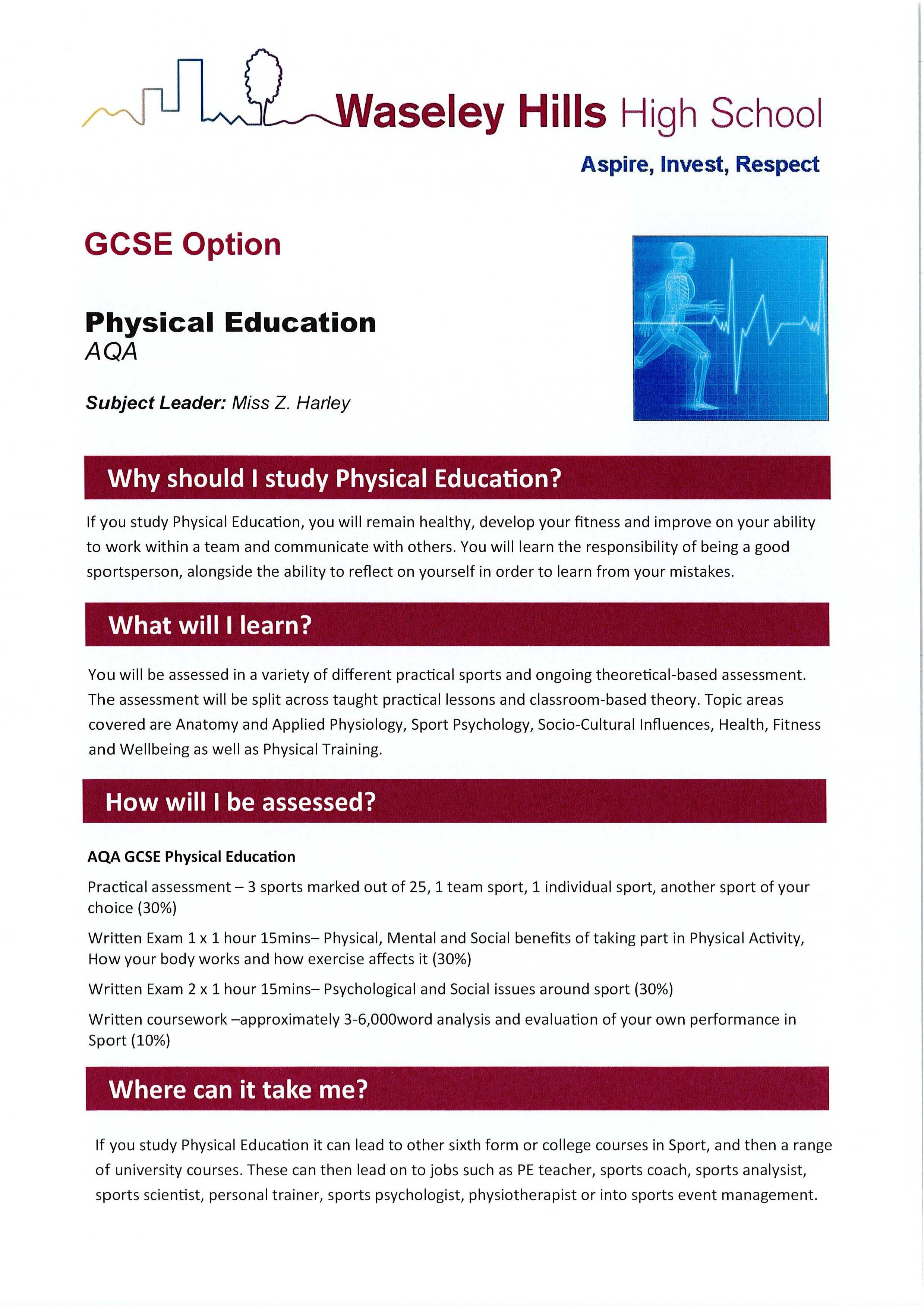
Physical Education
AQA
Subject Leader: Miss Z. Harley
Why should I study Physical Education?
If you study Physical Education, you will remain healthy, develop your fitness and improve on your ability to work within a team and communicate with others. You will learn the responsibility of being a good sportsperson, alongside the ability to reflect on yourself in order to learn from your mistakes.
What will | learn?
You will be assessed in a variety of different practical sports and ongoing theoretical-based assessment.
The assessment will be split across taught practical lessons and classroom-based theory. Topic areas covered are Anatomy and Applied Physiology, Sport Psychology, Socio-Cultural Influences, Health, Fitness and Wellbeing as well as Physical Training.
How will | be assessed?
AQA GCSE Physical Education Practical assessment — 3 sports marked out of 25, 1 team sport, 1 individual sport, another sport of your choice (30%)
Written Exam 1 x 1 hour 15mins— Physical, Mental and Social benefits of taking part in Physical Activity, How your body works and how exercise affects it (30%)
Written Exam 2 x 1 hour 15mins— Psychological and Social issues around sport (30%)
Written coursework —approximately 3-6,000word analysis and evaluation of your own performance in Sport (10%)
Where can it take me?
If you study Physical Education it can lead to other sixth form or college courses in Sport, and then a range of university courses. These can then lead on to jobs such as PE teacher, sports coach, sports analysist, sports scientist, personal trainer, sports psychologist, physiotherapist or into sports event management.
l i e i g e n
aseley Hills High School
Aspire, Invest, Respect
GCSE Option
Psychology
OCR
Why should | study Psychology?
Psychology can help you understand yourself and other people. It can help you develop sound analytical skills through applying the scientific method to the study of human behaviour.
Psychology is hugely relevant to our everyday lives including offering explanations for social behaviour
(like why people take part in riots) and helping us to understand many aspects of the mind such as sleep, dreaming and memory. A very important part of this course is that it is helping to tackle the stigma surrounding mental health in society.
What will | learn?
The OCR GCSE (9-1) in Psychology follows a clear and straightforward structure. It contains exciting subject content, helping students explain everyday social phenomena. Topics include Social Influence, Memory, Sleep and Dreaming, Criminal Behaviour, Developmental Psychology, Schizophrenia, Depression and Research Methods.
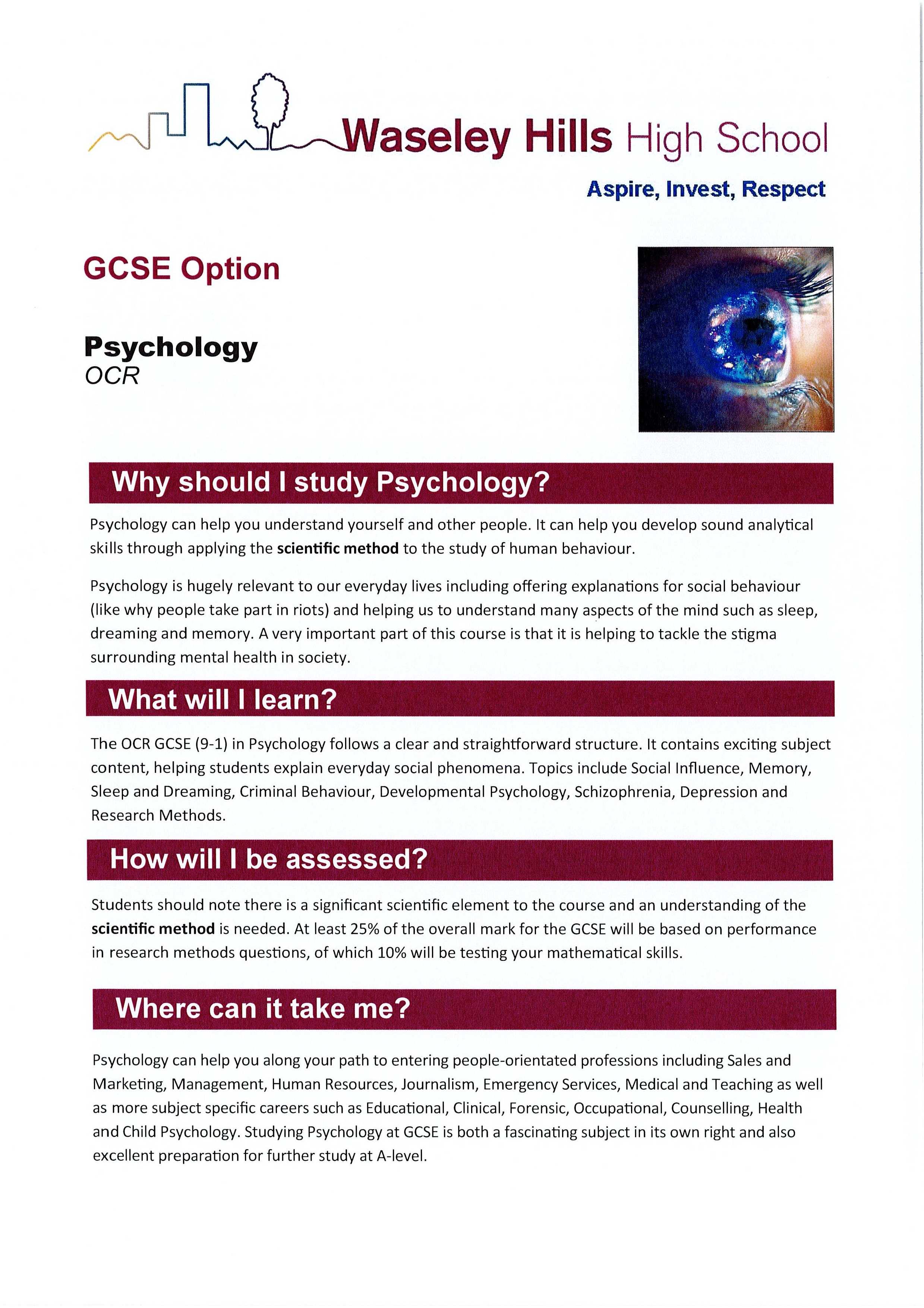
Ho
w will | be assessed?
Students should note there is a significant scientific element to the course and an understanding of the scientific method is needed. At least 25% of the overall mark for the GCSE will be based on performance in research methods questions, of which 10% will be testing your mathematical skills.
Where can it take me?
Psychology can help you along your path to entering people-orientated professions including Sales and Marketing, Management, Human Resources, Journalism, Emergency Services, Medical and Teaching as well as more subject specific careers such as Educational, Clinical, Forensic, Occupational, Counselling, Health and Child Psychology. Studying Psychology at GCSE is both a fascinating subject in its own right and also excellent preparation for further study at A-level.
:aseley Hills High Schoo!
Aspire, Invest, Respect
GCSE Option Religious Studies
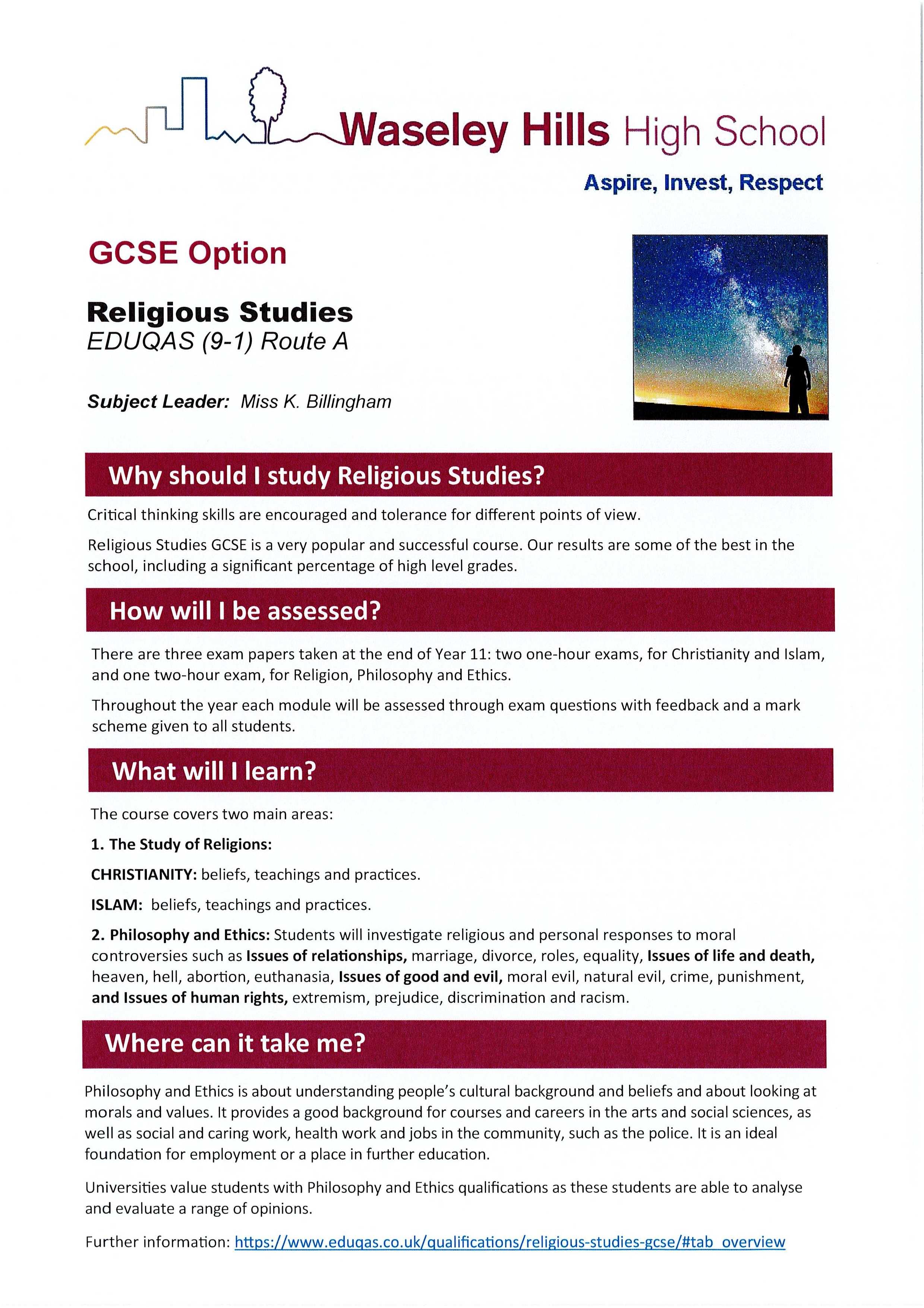
EDU@QAS (9-1) Route A
Subject Leader: Miss K. Billingham
Why should | study Religious Studies?
Critical thinking skills are encouraged and tolerance for different points of view. Religious Studies GCSE is a very popular and successful course. Our results are some of the best in the school, including a significant percentage of high level grades.
How will | be assessed?
There are three exam papers taken at the end of Year 11: two one-hour exams, for Christianity and Islam,
and one two-hour exam, for Religion, Philosophy and Ethics.
Throughout the year each module will be assessed through exam questions with feedback and a mark scheme given to all students.
What will | learn?
The course covers two main areas:
1. The Study of Religions:
CHRISTIANITY: beliefs, teachings and practices.
ISLAM: beliefs, teachings and practices.
2. Philosophy and Ethics: Students will investigate religious and personal responses to moral controversies such as Issues of relationships, marriage, divorce, roles, equality, Issues of life and death, heaven, hell, abortion, euthanasia, Issues of good and evil, moral evil, natural evil, crime, punishment, and Issues of human rights, extremism, prejudice, discrimination and racism.
Where can it take me?
Philosophy and Ethics is about understanding people’s cultural background and beliefs and about looking at morals and values. It provides a good background for courses and careers in the arts and social sciences, as well as social and caring work, health work and jobs in the community, such as the police. It is an ideal
foundation for employment or a place in further education.
Universities value students with Philosophy and Ethics qualifications as these students are able to analyse
and evaluate a range of opinions.
Further information: https://www.edugas.co.uk/qualifications/religious-studies-gcse/H#tab overview
tl LY waseley Hills High School
Aspire, Invest, Respect
GCSE Option
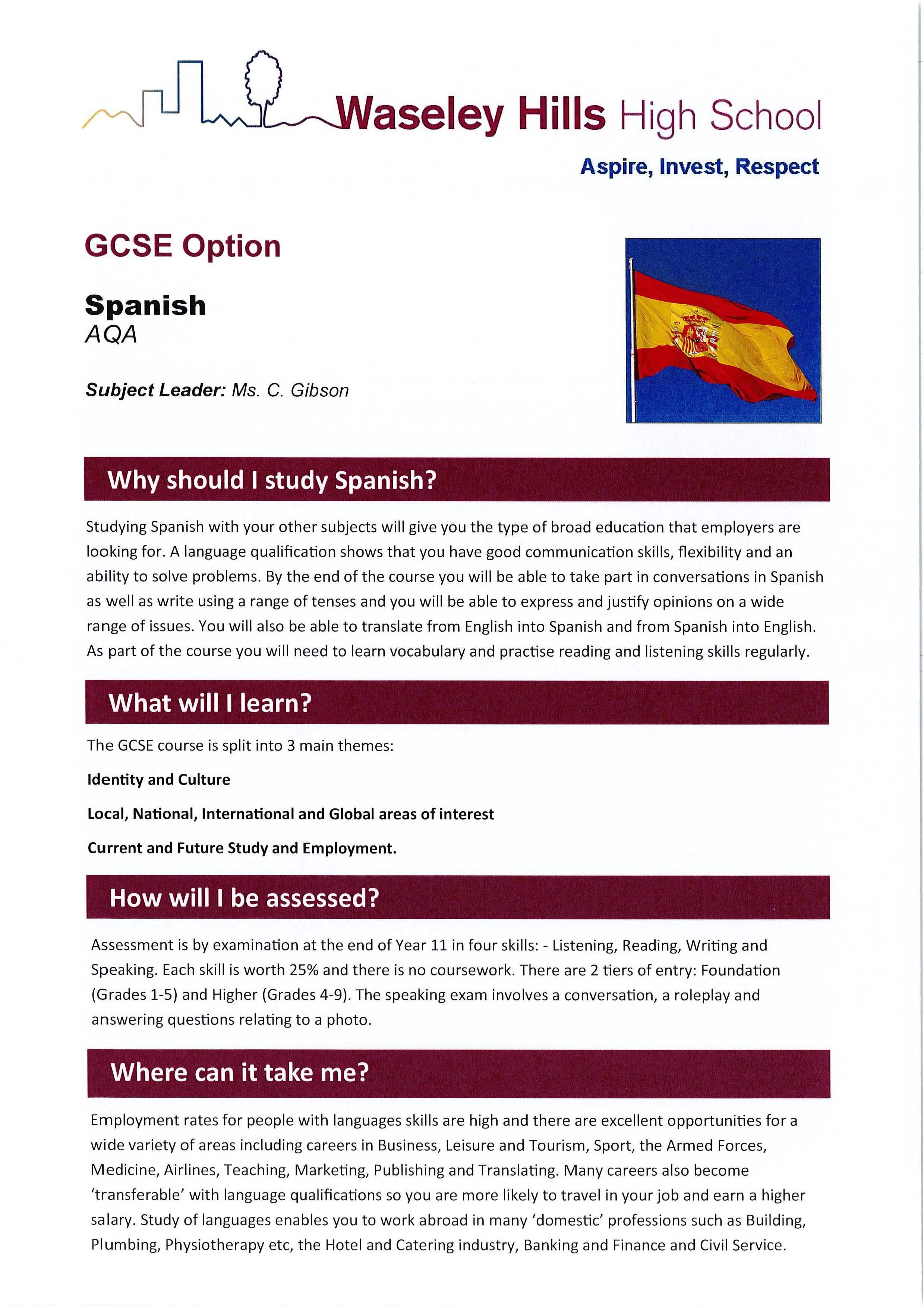
Spanish
AQA
Subject Leader: Ms. C. Gibson
Why should I study Spanish?
Studying Spanish with your other subjects will give you the type of broad education that employers are looking for. A language qualification shows that you have good communication skills, flexibility and an ability to solve problems. By the end of the course you will be able to take part in conversations in Spanish as well as write using a range of tenses and you will be able to express and justify opinions on a wide range of issues. You will also be able to translate from English into Spanish and from Spanish into English. As part of the course you will need to learn vocabulary and practise reading and listening skills regularly.
What will | learn?
The GCSE course is split into 3 main themes:
Identity and Culture
Local, National, International and Global areas of interest
Current and Future Study and Employment.
How will | be assessed?
Assessment is by examination at the end of Year 11 in four skills: - Listening, Reading, Writing and Speaking. Each skill is worth 25% and there is no coursework. There are 2 tiers of entry: Foundation
(Grades 1-5) and Higher (Grades 4-9). The speaking exam involves a conversation, a roleplay and answering questions relating to a photo.
Where can it take me?
Employment rates for people with languages skills are high and there are excellent opportunities for a wide variety of areas including careers in Business, Leisure and Tourism, Sport, the Armed Forces, Medicine, Airlines, Teaching, Marketing, Publishing and Translating. Many careers also become
‘transferable’ with language qualifications so you are more likely to travel in your job and earn a higher
salary. Study of languages enables you to work abroad in many ‘domestic’ professions such as Building,
Plumbing, Physiotherapy etc, the Hotel and
Catering industry, Banking and Finance and Civil Service.
pate
Waseley Hills
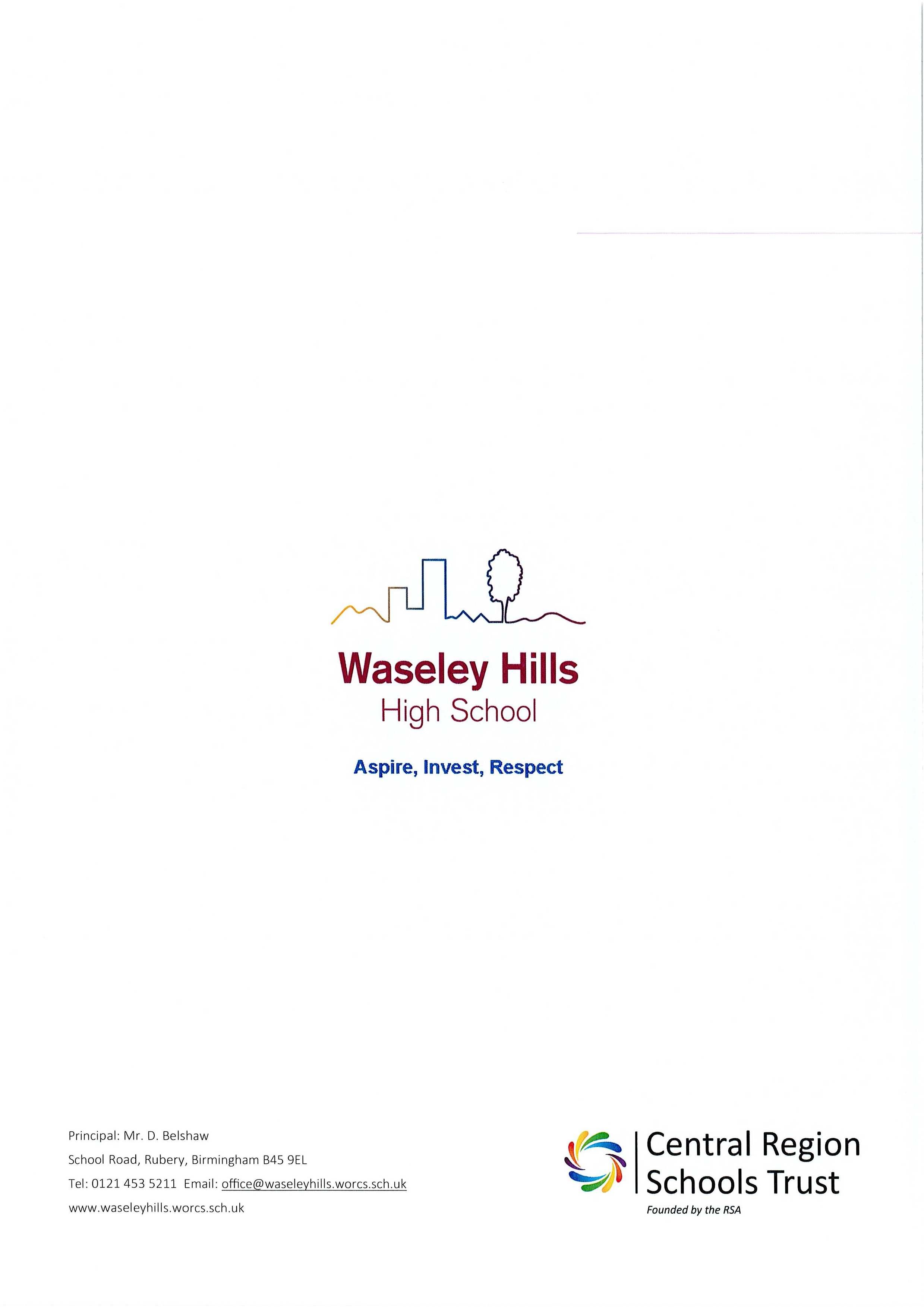
High School
Aspire, Invest, Respect
Principal: Mr. D. Belshaw °
School Road, Rubery, Birmingham B45 9EL
Tel: 0121 453 5211 Email: office@waseleyhills.worcs.sch.uk
GS ce ntra | Regio nN
~ Sc h OO S Tru st
www.waseleyhills.worcs.sch.uk Founded by the RSA
















